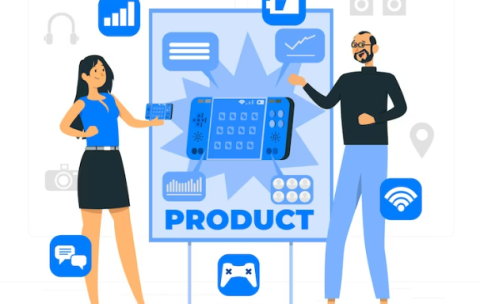Product Management
Product Management, a vital course in the MBA program, is …
What you'll learn
Week 1-2: Introduction to Product Management
Understanding the role of a product manager
Overview of the product management process
Key concepts in product strategy and vision
Week 3-4: Market Research and Customer Insights
Techniques for Conducting Market Research
Identifying customer needs and market gaps
Using customer insights to inform product decisions
Week 5-6: Product Development Process
Stages of product development
Agile and lean methodologies in product development
Cross-functional collaboration and product team dynamics
Week 7-8: Product Positioning and Branding
Developing a product positioning strategy
Branding and identity for products
Competitive analysis and differentiation
Week 9-10: Go-to-Market Strategies and Launch Planning
Planning and executing product launches
Marketing and sales alignment
Pricing strategies and distribution channels
Week 11-12: User Experience and Design Thinking
Principles of user experience (UX) design
Incorporating design thinking in product development
Prototyping and user testing
Week 13-14: Product Analytics and Performance Measurement
Metrics and KPIs for product management
Analyzing product performance data
Iteration and continuous improvement strategies
Week 15: Course Review and Final Assessment
Course Materials and Assessment:
Study Materials: Comprehensive lecture notes, case studies, video tutorials, and essential readings.
Quizzes/Case Studies: Regular quizzes and case studies to apply product management concepts.
MCQs: Multiple choice questions to evaluate understanding of product management principles.
Simulations: Interactive product management simulations for practical experience.
Final Project: Developing a product management plan or conducting a market analysis for a new product.
What you'll learn
Week 1-2: Introduction to Marketing
Fundamental concepts of marketing
Evolution of marketing theories and practices
The role of marketing in business and society
Week 3-4: Consumer Behavior and Market Research
Understanding consumer decision-making processes
Techniques for conducting market research
Analyzing and interpreting consumer data
Week 5-6: Marketing Strategy and Planning
Developing marketing strategies and plans
Market segmentation, targeting, and positioning
Competitive analysis and strategic marketing decisions
Week 7-8: Product and Brand Management
Product development and life cycle management
Building and managing brand equity
Strategies for product differentiation and positioning
Week 9-10: Digital Marketing and Social Media
Digital marketing channels and strategies
Leveraging social media for marketing
Measuring and analyzing digital marketing effectiveness
Week 11-12: Integrated Marketing Communications
Principles of integrated marketing communications
Advertising, public relations, and sales promotion strategies
Developing effective communication and media plans
Week 13-14: Global Marketing
Challenges and opportunities in global marketing
Cultural, legal, and ethical considerations in international markets
Global marketing strategies and practices
Week 15: Course Review and Final Assessment
Course Materials and Assessment:
Study Materials: Detailed lecture notes, case studies, video lectures, and recommended readings.
Quizzes/Case Studies: Regular quizzes and real-world case studies for practical application of marketing concepts.
MCQs: Multiple choice questions covering key marketing theories and practices.
Simulations: Marketing simulations to provide hands-on experience in crafting and executing marketing strategies.
Final Project: Development and presentation of a comprehensive marketing plan for a real or hypothetical company.
Navigating the Gig Economy: Opportunities and Strategies
Navigating the Gig Economy involves understanding and leveraging the growing …
What you'll learn
Week 1: Introduction to the Gig Economy (4 Hours)
Session 1 (2 Hours): Understanding the Gig Economy
What Is the Gig Economy?
Historical Context and Growth
Types of Gig Work and Platforms
Session 2 (2 Hours): Pros and Cons of Gig Work
Advantages and Disadvantages of Gig Work
Gig Workers' Characteristics
Gig Work and the Future of Employment
Week 2: Building Gig-Related Skills (6 Hours)
Session 3 (2 Hours): Developing Entrepreneurial Skills
Entrepreneurship in the Gig Economy
Identifying and Assessing Opportunities
Business Planning for Gig Work
Session 4 (2 Hours): Digital Literacy and Online Presence
Leveraging Technology for Gig Work
Creating a Personal Brand Online
Building an Effective Online Portfolio
Session 5 (2 Hours): Financial Management for Gig Workers
Budgeting and Financial Planning
Taxes and Legal Considerations
Retirement and Benefits in the Gig Economy
Week 3: Gig Work Strategies (6 Hours)
Session 6 (2 Hours): Gig Work Platforms and Freelancing
Utilizing Freelancing Platforms
Finding Gig Opportunities
Freelancing Best Practices
Session 7 (2 Hours): Gig Work Negotiation and Pricing
Bidding Strategies
Setting Competitive Prices
Negotiating Gig Contracts
Session 8 (2 Hours): Managing Client Relationships
Effective Communication with Clients
Building Long-Term Client Relationships
Handling Client Feedback and Disputes
Week 4: Career Advancement and Future Trends (4 Hours)
Session 9 (2 Hours): Networking and Building a Gig Network
Importance of Networking in the Gig Economy
Strategies for Expanding Your Network
Collaborative Gig Projects
Session 10 (2 Hours): Capstone Project and Course Wrap-Up
Developing a Gig Work Strategy
Presentation of Gig Work Plans
Course Recap and Future Trends in the Gig Economy
This course structure equips MBA students with the knowledge and practical skills needed to thrive in the gig economy. The capstone project allows students to apply their learning to create a personalized gig work strategy, setting them on a path toward successful and sustainable gig work careers.
Cultural and Arts Management
Cultural and Arts Management is a specialized field focusing on …
What you'll learn
Week 1: Foundations of Cultural and Arts Management (4 Hours)
Session 1 (2 Hours): Introduction to Cultural and Arts Management
Overview of the Arts and Cultural Sector
Key Concepts in Arts Management: Mission, Vision, and Value Creation
The Role of Arts Managers in Contemporary Culture
Session 2 (2 Hours): Arts Organizations and Their Ecosystems
Types of Arts and Cultural Organizations: Nonprofits, For-Profits, Community Arts
Understanding the Arts Ecosystem: Stakeholders, Audiences, and Partnerships
Analyzing the Economic and Social Impact of the Arts
Week 2: Strategic Management and Marketing in the Arts (6 Hours)
Session 3 (2 Hours): Strategic Planning for Arts Organizations
Developing and Implementing Strategic Plans in the Arts
Balancing Artistic Vision with Financial Viability
Case Studies on Successful Strategic Initiatives in the Arts
Session 4 (2 Hours): Marketing and Audience Development
Marketing Strategies for Arts Organizations
Audience Development and Engagement Techniques
Digital Marketing and Social Media in the Arts
Session 5 (2 Hours): Fundraising and Revenue Generation
Principles of Arts Fundraising and Development
Grant Writing, Sponsorships, and Donor Relations
Diversifying Revenue Streams: Membership Programs, Merchandising, and Services
Week 3: Operations, Governance, and Leadership in the Arts (6 Hours)
Session 6 (2 Hours): Operational Management in Arts Organizations
Day-to-Day Operations: Facilities Management, Event Planning, Staffing
Budgeting, Financial Management, and Reporting
Risk Management and Legal Issues in Arts Management
Session 7 (2 Hours): Governance and Ethical Considerations
Board Development and Governance Structures
Ethical Issues and Accountability in Arts Management
Building Transparent and Responsible Organizations
Session 8 (2 Hours): Leadership in the Arts
Leadership Styles and Skills in Cultural Management
Nurturing Creativity and Innovation in Teams
Leading Change and Resilience in Challenging Times
Week 4: Contemporary Issues and Capstone Project (4 Hours)
Session 9 (2 Hours): Contemporary Issues in Cultural and Arts Management
Addressing Current Challenges: Digital Transformation, Cultural Diversity, and Sustainability
Global Trends and Their Impact on Local Arts Scenes
Workshop on Tackling Contemporary Issues in Arts Management
Session 10 (2 Hours): Capstone Project Presentations and Course Conclusion
Development and Presentation of Capstone Projects on a Specific Challenge or Opportunity in Cultural and Arts Management
Group Critique and Feedback
Course Recap: Future Directions and Career Opportunities in Cultural and Arts Management
This course structure provides MBA students with a thorough understanding of cultural and arts management, combining lectures, case studies, practical workshops, and a capstone project. The curriculum is tailored to prepare students for leadership roles in arts and cultural organizations, emphasizing strategic management, sustainability, and community engagement.
IBM Cognos Analytics – Empowering Decisions with IBM Cognos Analytics
IBM Cognos Analytics – Empowering Decisions with IBM Cognos Analytics …
What you'll learn
Week 1: Introduction to IBM Cognos Analytics (4 Hours)
Session 1 (2 Hours): Overview of IBM Cognos Analytics
Introduction to Business Intelligence and the Role of IBM Cognos Analytics
Navigating the IBM Cognos Analytics Interface
Overview of Key Features and Capabilities
Session 2 (2 Hours): Basic Reporting and Dashboarding
Connecting to Data Sources in Cognos
Creating Simple Reports and Dashboards
Basic Data Visualization Techniques
Week 2: Advanced Reporting and Data Exploration (6 Hours)
Session 3 (2 Hours): Advanced Reporting Techniques
Building Advanced Reports (List, Crosstab, and Chart Reports)
Applying Filters, Prompts, and Calculations
Report Formatting and Styling for Clarity and Impact
Session 4 (2 Hours): Interactive Dashboards and Visualization
Designing Interactive Dashboards
Advanced Visualization Techniques in Cognos
Using Drill-Throughs for Detailed Data Analysis
Session 5 (2 Hours): Data Exploration and Analysis
Exploratory Data Analysis in Cognos Analytics
Utilizing Cognos for Trend Analysis and Pattern Discovery
Integrating External Data and Leveraging Advanced Analytics
Week 3: Data Modeling and Framework Manager (6 Hours)
Session 6 (2 Hours): Introduction to Data Modeling
Basics of Data Modeling in Cognos
Creating and Managing Packages
Understanding the Framework Manager
Session 7 (2 Hours): Advanced Data Modeling Concepts
Building Dimensional Models
Working with Different Query Subjects
Implementing Security in Models
Session 8 (2 Hours): Practical Modeling Exercises
Hands-on Data Modeling Exercise
Best Practices in Data Modeling for Business Reporting
Reviewing and Optimizing Models
Week 4: Business Applications and Capstone Project (4 Hours)
Session 9 (2 Hours): Cognos Analytics in Business Contexts
Applying Cognos Analytics to Solve Business Problems
Case Studies: Cognos in Different Industry Settings
Discussing the Strategic Impact of Business Intelligence
Session 10 (2 Hours): Capstone Project and Course Wrap-Up
Developing a Comprehensive Business Intelligence Project Using Cognos Analytics
Presentation and Review of Capstone Projects
Course Summary and Pathways for Further Learning
This course should include a mix of lectures, hands-on practical exercises, and case studies. The capstone project in the final week would allow students to apply their learning to a comprehensive business intelligence task, ensuring they understand not only how to use IBM Cognos Analytics but also how to apply it strategically in a business context.
Looker Data Analytics – Unveiling Insights with Looker Data Analytics
Unveiling Insights with Looker Data Analytics is an in-depth course …
What you'll learn
Week 1: Introduction to Looker and Basic Concepts (4 Hours)
Session 1 (2 Hours): Overview of Looker and Business Intelligence
Introduction to Business Intelligence and Looker's Role
Navigating the Looker Interface
Overview of Key Features and Functionalities
Session 2 (2 Hours): Connecting Data and Basic Reporting
Setting Up and Connecting Data Sources
Creating Basic Reports (Looks) and Exploring Data
Introduction to LookML (Looker Modeling Language)
Week 2: Advanced Reporting and Visualization (6 Hours)
Session 3 (2 Hours): Advanced Reporting Techniques
Building More Complex Reports and Dashboards
Exploring Advanced Visualization Options
Utilizing Filters, Parameters, and Derived Tables
Session 4 (2 Hours): Interactive Dashboards and Data Exploration
Designing Interactive and Dynamic Dashboards
Best Practices in Dashboard Layout and User Experience
Analyzing Data Trends and Patterns
Session 5 (2 Hours): Data Exploration and Analytics
Drill-Downs and Detailed Data Analysis
Utilizing Looker for Business Analytics
Sharing Insights and Collaborative Features
Week 3: LookML and Data Modeling (6 Hours)
Session 6 (2 Hours): Introduction to LookML
Basics of LookML and its Role in Looker
Creating and Managing LookML Models
Defining Dimensions, Measures, and Views
Session 7 (2 Hours): Advanced LookML Features
Advanced Model and View Development
Utilizing LookML for Complex Data Relationships
Implementing Data Governance in Looker
Session 8 (2 Hours): Hands-on LookML Workshop
Practical Exercise in Building and Optimizing a LookML Model
Troubleshooting Common Issues in LookML
Best Practices for Scalable and Maintainable Models
Week 4: Business Application and Capstone Project (4 Hours)
Session 9 (2 Hours): Looker in the Business Context
Case Studies: Real-world Applications of Looker in Various Industries
Strategic Decision-Making with Looker
Discussing Ethical Considerations in Data Analysis
Session 10 (2 Hours): Capstone Project and Course Wrap-Up
Developing a Comprehensive Business Analytics Project using Looker
Presentation and Critique of Capstone Projects
Course Summary and Future Learning Pathways
The course should be a mix of lectures, demonstrations, hands-on exercises, and case studies. The capstone project in the final week would allow students to apply their learning to develop a full-scale business analytics project, ensuring they understand not only how to use Looker but also how to apply it strategically in a business context.
Machine Learning and Artificial Intelligence in Business – Driving Business Innovation with AI and Machine Learning
“Machine Learning and Artificial Intelligence in Business – Driving Business …
What you'll learn
Week 1: Introduction to AI and Machine Learning (4 Hours)
Session 1 (2 Hours): Introduction to AI and Machine Learning in Business
Overview of AI and Machine Learning
Historical Context and Evolution of AI
Key Concepts and Terminology
Session 2 (2 Hours): Understanding Machine Learning Models
Types of Machine Learning: Supervised, Unsupervised, Reinforcement
Introduction to Algorithms and Model Selection
Basic Tools and Software Overview (e.g., Python, TensorFlow)
Week 2: Data Management and Preprocessing (6 Hours)
Session 3 (2 Hours): Data Collection and Management
Understanding Data Types and Sources
Data Collection and Storage Strategies
Ethics and Privacy in Data Handling
Session 4 (2 Hours): Data Preprocessing and Feature Engineering
Data Cleaning and Transformation
Feature Selection and Engineering Techniques
Introduction to Data Visualization Tools
Session 5 (2 Hours): Exploratory Data Analysis (EDA)
Techniques for EDA
Identifying Patterns and Anomalies in Data
Using EDA Tools and Libraries
Week 3: Building and Evaluating Models (6 Hours)
Session 6 (2 Hours): Supervised Learning Techniques
Introduction to Regression and Classification Models
Building and Training Models
Case Studies in Business Applications
Session 7 (2 Hours): Unsupervised Learning and Clustering
Overview of Clustering Techniques
Dimensionality Reduction Methods
Practical Applications in Market Segmentation
Session 8 (2 Hours): Model Evaluation and Tuning
Techniques for Evaluating Model Performance
Overfitting, Underfitting, and Model Tuning
Cross-Validation and Hyperparameter Tuning
Week 4: Advanced Topics and Business Applications (4 Hours)
Session 9 (2 Hours): Advanced Topics in AI and ML
Introduction to Neural Networks and Deep Learning
AI in Natural Language Processing and Computer Vision
Emerging Trends and Future of AI in Business
Session 10 (2 Hours): Strategic Implementation and Capstone Project
Strategies for Implementing AI and ML in Business
Ethical Considerations and AI Governance
Capstone Project Presentation and Course Wrap-Up
The course would ideally blend lectures with hands-on exercises, case studies, and project work. The capstone project should involve applying AI and ML concepts to a real-world business problem, encouraging students to think critically about the strategic application of these technologies in a corporate setting. This structure ensures that MBA students gain not only the technical knowledge of AI and ML but also understand how to leverage these technologies for strategic advantage in various business sectors.
Microsoft Excel Power Query, Power Pivot & DAX – Excel Advanced Tools: Power Query, Pivot & DAX Mastery
Microsoft Excel Power Query, Power Pivot & DAX – Excel …
What you'll learn
Week 1: Introduction to Power Query and Data Manipulation (4 Hours)
Session 1 (2 Hours): Fundamentals of Power Query
Introduction to Power Query and its Business Applications
Navigating the Power Query Interface
Basic Data Importing and Transformation Techniques
Session 2 (2 Hours): Advanced Data Handling in Power Query
Merging and Appending Queries
Working with Different Data Sources (Web, SQL, etc.)
Advanced Data Transformations and Cleaning Techniques
Week 2: Power Pivot and Data Modeling (6 Hours)
Session 3 (2 Hours): Introduction to Power Pivot
Overview of Power Pivot and its Role in Data Analysis
Creating Data Models in Power Pivot
Understanding Relationships and Data Model Optimization
Session 4 (2 Hours): Advanced Data Modeling in Power Pivot
Working with Large Datasets
Creating Complex Relationships and Hierarchies
Introduction to Key Performance Indicators (KPIs) in Power Pivot
Session 5 (2 Hours): PivotTables and PivotCharts with Power Pivot
Building Advanced PivotTables and PivotCharts
Using Slicers and Timelines for Interactive Reports
Combining Power Query and Power Pivot for Analysis
Week 3: Introduction to DAX (Data Analysis Expressions) (6 Hours)
Session 6 (2 Hours): Basics of DAX
Understanding DAX and its Syntax
Basic DAX Functions and Formulas
Creating Calculated Columns and Measures
Session 7 (2 Hours): Advanced DAX Functions
Time Intelligence Functions
Advanced DAX Formulas for Complex Calculations
Understanding Context in DAX (Row vs. Filter Context)
Session 8 (2 Hours): Practical DAX Applications
Applying DAX in Real-World Business Scenarios
Using DAX for Data Analysis and Reporting
Hands-On Exercises and Case Studies
Week 4: Integrating Skills and Capstone Project (4 Hours)
Session 9 (2 Hours): Integrating Power Query, Power Pivot, and DAX
Combining Skills for Comprehensive Data Analysis
Best Practices for Building Scalable and Efficient Excel Models
Addressing Common Business Data Analysis Challenges
Session 10 (2 Hours): Capstone Project and Course Wrap-Up
Applying Learned Skills to a Real-World Business Problem
Group Project Presentation and Review
Course Summary and Pathways for Further Learning
The course should include a mix of theoretical instruction, practical demonstrations, and hands-on exercises. The capstone project in the final week should involve a comprehensive business analysis task, enabling students to apply their newly acquired skills in Power Query, Power Pivot, and DAX to a real-world business scenario. This structure ensures that MBA students not only learn advanced Excel features but also understand how to apply these tools strategically for business analysis and decision-making.










